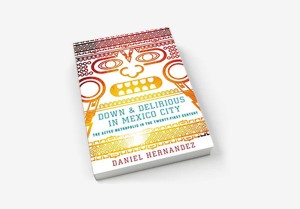In just a few hours, today’s radio show with special guest Daniel Hernandez! Mudd Up Mondays 7pm-8pm EST wfmu.org 91.1 FM NYC.

[Daniel Hernandez, photo by Hector ‘Chucho’ Jimenez for http://frente.com.mx/]
I previewed tonight’s show here. The above portrait comes from a recent Spanish-language interview in Frente (warning: it’s one of those horrible flash-based sites whose ‘digital layouts’ ensure that none of the content can ever be linked to). Clearly, Daniel brought the heat to our city today. The radio show kicks off his NYC stint, keep an eye out for the Thursday book party + Columbia U. talk
Right now I’d like to excerpt two sections from his new book, Down and Delirious in Mexico City. Together they hint at its narrative arc as Daniel moves from “a sort of native foreigner” to a sharp-eyed chilango whose self has been rewritten by the city he writes of — from ex-punks tending their aging legacies to the birth of fashion blogging to neo-indigenista sweat lodges– with such lyricism and insight.
from Chapter 2: Points of Arrival
“And this is the house where La Malinche lived,” Victor says, pointing to a plain colonial structure on Calle República de Cuba, in the Centro. The building doesn’t seem like much: pink walls, brown wooden doors that appear indifferent to their age, shuttered windows. On a wall high above the sidewalk, a tile marker with blue cursive script indicates that “according to the tradition” the house once belonged to a woman named Doña Marina. Also known by her Indian name Malinalli Tenepal, Marina served infamously as Hernán Cortés’s translator and mistress during his conquest of the Aztec empire.
“Uff,” I respond, and frown. Among some Mexicans in the United States, La Malinche is reviled as a traitor, the Judas Iscariot of the New World. By grunting I think I am doing my duty.
But Victor, an artist with whom I have struck a fast friendship, recoils. “You Chicanos need to get over the conquista,” he says. “La Malinche was amazing. She was incredibly smart and beautiful and knew many languages. She is one of the only women historical figures we have from the period.”
I am strolling with Victor after lunch. It is a warm and drizzly day, mid-July 2002, just a few weeks into my first visit to Mexico City. From the moment I land, nearly every human interaction and every street corner turned offers an eye-widening lession. The onslaught of information and sensations leaves me fatigued. Almost anything I say is analyzed, mocked, or critiqued in relation to my being a sort of native foreigner — a Mexican born in the United States, Mexican but not quite. Victor’s reproach shocks my brain. . .
And then, crescendoing with feverish visions after several years spent in D.F., we get to this section of chapter 15: The Seven Muses of Mexico City:
Everything is thrilling in Mexico City because everything is out of whack. There is a sense of delirious rupture, everywhere. The Cathedral, built over a dead Aztec temple, is sinking. The video game arcades are packed. I’m looking at male stripper clubs for women in Iztapalapa, extremely open public displays of affection on the metro, between men and women, children, and men and men, at political propaganda calling for the death penalty for kidnappers. A man without legs is begging on the sidewalks, just a human stump riding a skateboard. A little indigenous girl is stricken with panic, screaming in an indigenous language, as she gets off a metro car before her mother can reach the closing doors. On the platforms, the blind are walking with blind. Chaos and mutation on every corner. How, I wonder, can we mediate the doom?
We are not asking it enough. We are watching out for ourselves, like true urban rats, wondering, What is it that I want? I fall into the same mind-frame, thinking lecherously, I want it all. I want clothes. I want the Hustle. I’m a Mexico City mutant eating sidewalk hamburgers for dinner under a pounding brown rain. I want cactus juice to flow through my veins. I want to dance upon the pyramids. I want to sweat droplets of jade. I want acid.
+ + +
Bogota’s Frente Cumbiero has a year-old mixtape of originals and edits, which makes for a fine soundtrack to our displaced Mexico City memories on this warm Nueva Jork / Puebla York / Neza York day:












